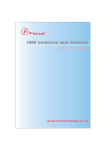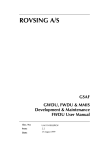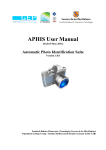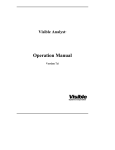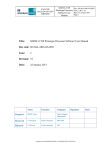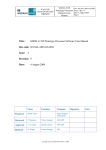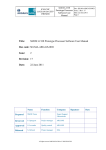Download HERE - INFRES
Transcript
CSIC Project Guidelines
How to engineer your project
Preliminaries
Each team should have 3 members
{
{
Team leader
{
{
{
1 x team leader role
2 x technical roles
Organizational responsibility
Work breakdown and assignment
Development work
Technical members
{
{
Feedback to team leader
Development work
Phases of the process
Analysis
{
{
Design
{
{
Requirements capture
Specification
Functional decomposition (if any)
UML Design
Implementation
Testing (validation and verification)
Interaction in phases
1)
Problem statement
{
2)
Requirements and specification
{
3)
4)
Internal for team
Testing
{
6)
Team Æ Coordinator
Repeat step 2 to satisfaction of coordinator
Code
{
5)
Coordinator Æ Team
Internal for team
Project documentation and working system
{
Team Æ Coordinator
The process itself
Our projects are very simple
So the waterfall model should suffice
Requirements and specification doc
Requirements
capture and
specification
System and
software design
Design document
Implementation
and unit testing
Integration
and testing
Code
User manual and
final system
Another possibility
In case you need to iterate
{
{
Document the source and target phases
Generate an “engineering change notice”
Requirements
capture and
specification
System and
software design
Implementation
and unit testing
Integration
and testing
Requirements & specifications
List requirements in a numbered
hierarchical format
You may also use UML use-cases
Express the specification using DFDs
Give requirements and specifications in the
same document
Try to finalize your requirements
{
Requirements are like water, they're easier to
build on when they're frozen
Design
You should ideally use UML
Use class diagrams to generate the static code
structure of your application
Define your interfaces clearly
Delineate the responsibility of various classes and
components explicitly
Document
{
{
Functional units (what everything is supposed to do)
Interfaces (what each function expects, any preconditions, any post-conditions, errors generated)
Act in haste and repent at leisure, code too soon
and debug forever
Coding
Code cleanly
{
Any fool can write code that a computer can understand,
good programmers write code that humans can
understand
Pick a coding convention and stick to it
Comment a lot
Divide work up according to functional units
Have a multi-file project, it will help
Handle non-nominal cases (i.e.: errors)
Use Eclipse (an advisory, in your own interest)
Keep your UI functional and simple
Integration and testing
Should be easy if you documented your
interfaces well
Be careful of how/where your errors are
propagated and handled
Try to be as foolish as possible when testing
your system
{
{
{
S/W engineering is a battle between
programmers making their programs more and
more fool-proof, and the universe, making bigger
and bigger fools
So far, the universe is winning
Your project coordinators will be the fools when
testing your system
Delivery
Expected on time
Should include
{
{
{
Working system
User manual
A README on how to install and any
extraneous requirements to run it
Good luck!












